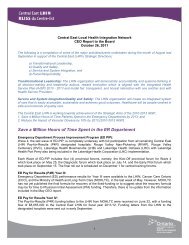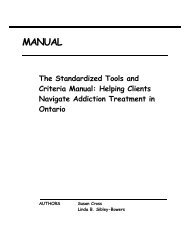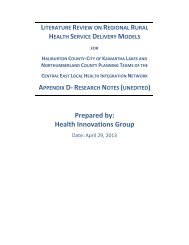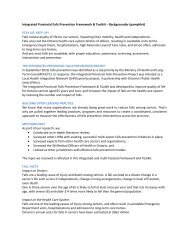CDE Appendix 1 Literature Review - Central East Local Health ...
CDE Appendix 1 Literature Review - Central East Local Health ...
CDE Appendix 1 Literature Review - Central East Local Health ...
You also want an ePaper? Increase the reach of your titles
YUMPU automatically turns print PDFs into web optimized ePapers that Google loves.
The Culture, Diversity and Equity Project: <strong>Literature</strong> <strong>Review</strong><br />
• Private health insurers such as Kaiser Permanente, Aetna, and BlueCross BlueShield of Florida, have been<br />
particularly active in developing cultural competence initiatives (see Betancourt et al., 2005 for more on these<br />
initiatives). The California Endowment, a private, state-wide health foundation that was created in 1996 as a<br />
result of Blue Cross of California's creation of WellPoint <strong>Health</strong> Networks (a for-profit corporation) has been<br />
especially active in developing research and initiatives aimed at improving the cultural and linguistic<br />
competence of the US healthcare system.<br />
Also of particular note in this respect is the Institute for Culturally Competent Care of the Kaiser<br />
Permanente - America's leading nonprofit integrated health plan, serving approximately 8.2 million people in<br />
nine states and the District of Columbia – which has established numerous ‘'Centers of Excellence' for<br />
different racial/ethnic groups in their efforts to raise the profile of cultural competency within their health-care<br />
provision. Various other philanthropic foundations, such as the Robert Wood Johnson Foundation and<br />
Commonwealth Fund in particular, have also actively pursued agendas seeking to widen access to health care<br />
through research and demonstration projects.<br />
Limitations and Challenges<br />
Among the challenges and limitations of American policy developments addressing health and healthcare disparities<br />
discussed in the literature are the following:<br />
• Failure to address broader determinants of health and structural patterns of socio-economic inequality and<br />
disadvantage as these impact upon health disparities (Raphael and Bryant, 2006; Exworthy et al., 2006;<br />
Exworthy & Washington, 2006);<br />
• Overly exclusive focus on ethnic and racial disparities in healthcare service, to the neglect of other bases and<br />
forms of disparity (Raphael & Bryant, 2006);<br />
• Narrow and exclusive focus on healthcare disparities and/or confusion or conflation of healthcare disparities<br />
with disparities in health status (Exworthy & Washington, 2006);<br />
• Dominance of medical model and individual-behavioural approaches to the neglect of broader public policy<br />
solutions to disparities. Fundamental reluctance to view such broader social inequities and determinants of<br />
health as a public policy matter (Raphael & Bryant, 2006);<br />
• Flawed tendency to ascribe all health inequalities to biological or cultural causes as a result of official US<br />
statistics near exclusive reporting of health inequalities by race rather than by socioeconomic status (Howden-<br />
Chapman & Kawachi, 2002).<br />
Dominant Framework<br />
• <strong>Health</strong>care Equity Frameworks, more specifically, cultural competence frameworks focusing on issues of<br />
race/ethnicity and accessibility to healthcare services.<br />
Rating on Whitehead’s Action Spectrum<br />
• The dominant state of affairs, as concerns health equity efforts in the broad (social determinants of health<br />
inclusive) sense, ranges from Awareness Raising to Denial/Indifference and Mental Block<br />
• As concerns healthcare equity and cultural competence in particular, the dominant state of affairs could be<br />
characterised as isolated initiatives and awareness raising.<br />
England<br />
Policy/Strategy Developments<br />
Over a short period of time following the election of the Labour government in 1997, the UK has rapidly become a,<br />
if not the, leader in governmental health equity policy and action aimed at not only the healthcare system but also<br />
addressing wider determinants of health/health equity. Among the landmark UK policies, strategies and initiatives<br />
described in the literature are:<br />
69

















